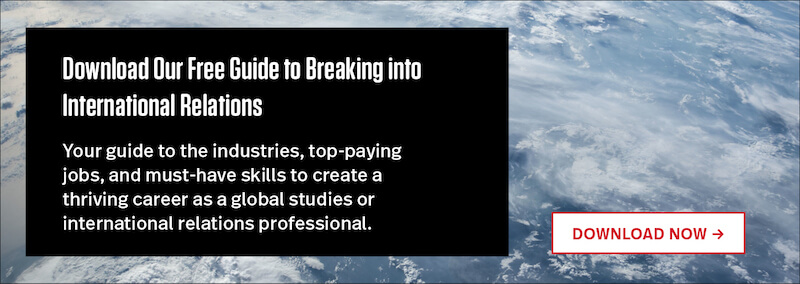In an increasingly global economy, leaders with skills in analysis, research, diplomacy, and cross-cultural relations are in high demand. Organizations including multinational corporations, government agencies, and nonprofits all employ international consultants to help drive key business decisions and develop strategic plans.
Success as an international consultant requires that individuals not only understand different cultures but are sensitive to what makes cultures different. Management styles, negotiation tactics, presentation techniques, and even dress codes all need to be adapted to where one is doing business.
Developing and maintaining a global perspective requires skills and training in both global studies and international relations. These disciplines are closely linked, but there are some subtle differences.
- Global studies explores issues such as politics, biology, culture, and economics through an international lens. It emphasizes how people, ideas, materials, and even diseases move across countries and oceans.
- International relations, on the other hand, focuses on the specific and unique relationships between nations and cultures. It emphasizes how these relationships impact diplomacy, politics, commercial and economic policy, legal disputes, and security.
If these topics interest you on a personal and professional level, then a career in international consulting may be right for you. Here’s what you need to know about what international consultants do, where they work, and how much they get paid.
Download Our Free Guide to Breaking into Global Studies and International Relations
A guide for what you need to know to prepare for, and work in, today’s globalized world.
What do International Consultants Do?
According to the Dictionary of International Trade, a leader in an international consulting role typically takes on the following responsibilities:
- Assess an organization’s future activities in foreign markets, such as opening a new facility or identifying a new business partner.
- Work closely with management and executive teams to develop strategic plans for both existing and emerging markets.
- Collaborate across disciplines within an organization, including human resources, IT, market research, and other business-line leaders.
- Communicate effectively in English and other languages, such as the native language of the country where one is based.
A Master of Science in Global Studies and International Relations prepares students to carry out these job responsibilities by building relevant skills. Students in the GSIR program:
- Learn and apply the theories, research methods, and approaches that are most relevant for investigating global issues.
- Evaluate contemporary political, social, and cultural issues from a government, nonprofit, or private-sector viewpoint—regardless of the type of organization they represent.
- Gain perspectives from diverse fields of study, apply this knowledge to a practical challenge, and use the insights from the experience to respond to new and more complex challenges.
- Advise a global organization, gain international field study experience, and present research findings in an overseas location.
Types of Organizations Offering International Consulting Jobs
A LinkedIn search for international consultant jobs shows that the companies that employ international consultants fall into several key categories. (In addition to LinkedIn results, sample job titles come from The Balance, a news site focused on job searching and career planning.)
Consulting Firms
Consulting firms such as Accenture, Boston Consulting Group, Deloitte, and McKinsey have offices on all six continents. Roles at these firms can include short-term projects, long-term assignments, or permanent transfers. Consultants typically help organizations overcome existing challenges and plan for future growth. For example, a retail chain may want to know which new markets present the best opportunity or expansion, or a construction company may want to identify more sustainable suppliers for building materials.
Sample job titles: International project consultant, strategic management consultant, international development director, international business analyst, international business development manager
Multinational Companies
Multinational companies in industries such as banking, energy, technology, and construction are looking for business development leaders with both international consulting expertise and job experience in a particular field. Common international business careers include human resources, accounting, project management, compliance, cybersecurity, sales, and marketing. These are roles in which companies place a high value on an employee’s ability to work in a cross-cultural setting, manage diverse teams, and understand how to follow regulations in global markets.
Sample job titles: Mergers and acquisitions consultant, international project manager, global value and access consultant, international operations consulting manager, international technology coordinator, foreign currency investment advisor, global supply manager, import/export specialist, international health and benefits consultant
Government and International Development Agencies
Government agencies and international development organizations such as the U.S. Department of State, the United Nations, or the World Health Organization focus on international relations—diplomacy, foreign policy, intelligence, security, etc. This type of work is often a path into politics, but careers in global studies and international relations can also include military affairs, security, trade, and activism. Collaboration is an essential part of this work, as leaders must work alongside colleagues with a variety of skills, specialties, and backgrounds in order to accomplish their goals.
Sample job titles: Foreign affairs specialist, foreign policy advisor, foreign service officer, counterintelligence officer, intelligence analyst, foreign service officer, national security agent, diplomat, ambassador
Non-Government Organizations (NGOs)
Non-government organizations, or NGOs, focus on issues such as addressing climate change, improving education, increasing access to health care, preserving cultural heritage, developing local economies, and advancing science and technology. International consulting roles for these organizations may be based in the field or in a group’s headquarters in a major city. In addition, an organization’s efforts are likely to center on one of six major regions of the world—East Asia, Europe, Latin America, Middle East, Southwest and Central Asia, and Sub-Saharan Africa—so specialized work experience or educational background is a plus.
Sample job titles: Global relations officer, country director, grants and compliance manager, response team leader, humanitarian program manager, foreign aid worker, human rights activist
Niche Industries
Niche industries focus on very specialized markets that have a global audience. Examples include executive recruitment firms, luxury travel and real estate agencies, meeting and event planning, art collection, and relocation consultants that help individuals find jobs and/or housing in another country.
Sample job titles: International business meeting planner, international travel counselor, international move management consultant, relocation consultant, international retirement leader, international travel recruiter
International Consulting Salaries
According to PayScale, the average salary for an individual with a master’s degree in global studies and international relations ranges from $67,000 to $70,000.
However, since international consultants can work for a variety of types of organizations, actual salaries can vary widely, depending on the type of organization, location of the work, and area of specialization. Consulting firms and for-profit companies, for example, tend to pay higher salaries than non-government organizations. Salaries will also vary based on a location’s cost of living, with jobs typically paying more in cities such as Hong Kong, London, New York, or Tokyo. The specialization of the international consulting role also matters—jobs in political and government affairs tend to have higher salaries than those in military operations, foreign affairs, or security analysis.
Here are some other salary considerations for an international consulting career:
- The U.S. Department of State offers hardship pay increases of up to 35 percent for diplomats who serve in volatile areas such as Afghanistan, Bangladesh, Syria, and certain parts of Africa.
- Total compensation for new hires at consulting firms may be up to 30 percent higher than their base salary. New hires often receive signing and relocation or housing bonuses and are eligible for performance bonuses, as well.
- Even if you prefer to live and work in the United States, developing a global perspective can help you earn more. For example, the average salary for a global logistics manager is about $93,000, according to PayScale, compared to about $65,000 for a domestic logistics manager. That’s an increase of nearly 43 percent. Likewise, the average salary of a sales manager is about $61,000, while the average salary of an international sales manager is more than $78,000—a difference of more than 27 percent.
How to Get a Job in International Consulting
Roles in international consulting and business can be difficult to get. Landing a job with the U.S. Department of State, for example, requires an extensive application and interview, as well as a background check and a medical exam. If this is the career path you want, be prepared for a months-long process.
It can also be hard to search for jobs that are based in a different country. Transitions Abroad, a magazine and news site for international job-seekers, points to the power of networking both online and in-person, starting with people you already know and focusing on high-quality relationships rather than a large number of impersonal relationships.
When networking, it’s important to be specific about your experience, the type of career you want, the type of organizations you are interested in, and your timeline for moving abroad. Being specific has two benefits: It helps you narrow down the list of people you want to network with, and it can help these contacts point you in the right direction.
Earning a master’s degree in global studies and international relations can help you identify and network with the right people to help you land the international consultant role you want. The degree program also gives you the experience you need to work successfully in a global setting, no matter where in the world you live, what type of organization you represent, or which field you enter. You’ll develop the skills you need to become a respected and trusted team leader.







Related Articles
How You Can Use Geographic Information Technology
5 Reasons to Study International Relations and Diplomacy
Master’s Lands Alum Role with the Dept. of Homeland Security